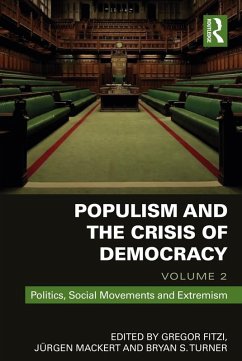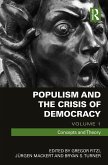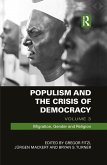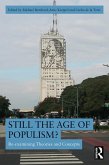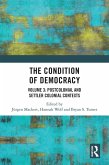Populism and the Crisis of Democracy (eBook, ePUB)
Volume 2: Politics, Social Movements and Extremism
Redaktion: Fitzi, Gregor; Turner, Bryan; Mackert, Juergen
45,95 €
45,95 €
inkl. MwSt.
Sofort per Download lieferbar

23 °P sammeln
45,95 €
Als Download kaufen

45,95 €
inkl. MwSt.
Sofort per Download lieferbar

23 °P sammeln
Jetzt verschenken
Alle Infos zum eBook verschenken
45,95 €
inkl. MwSt.
Sofort per Download lieferbar
Alle Infos zum eBook verschenken

23 °P sammeln
Populism and the Crisis of Democracy (eBook, ePUB)
Volume 2: Politics, Social Movements and Extremism
Redaktion: Fitzi, Gregor; Turner, Bryan; Mackert, Juergen
- Format: ePub
- Merkliste
- Auf die Merkliste
- Bewerten Bewerten
- Teilen
- Produkt teilen
- Produkterinnerung
- Produkterinnerung

Bitte loggen Sie sich zunächst in Ihr Kundenkonto ein oder registrieren Sie sich bei
bücher.de, um das eBook-Abo tolino select nutzen zu können.
Hier können Sie sich einloggen
Hier können Sie sich einloggen
Sie sind bereits eingeloggt. Klicken Sie auf 2. tolino select Abo, um fortzufahren.

Bitte loggen Sie sich zunächst in Ihr Kundenkonto ein oder registrieren Sie sich bei bücher.de, um das eBook-Abo tolino select nutzen zu können.
Politics, Social Movements and Extremism take serious the fact that populism is a symptom of the crisis of representation that is affecting parliamentary democracy. Right-wing populism skyrocketed to electoral success and is now part of the government in several European countries.
- Geräte: eReader
- mit Kopierschutz
- eBook Hilfe
- Größe: 0.74MB
Andere Kunden interessierten sich auch für
![Populism and the Crisis of Democracy (eBook, ePUB) Populism and the Crisis of Democracy (eBook, ePUB)]() Populism and the Crisis of Democracy (eBook, ePUB)44,95 €
Populism and the Crisis of Democracy (eBook, ePUB)44,95 €![Populism and the Crisis of Democracy (eBook, ePUB) Populism and the Crisis of Democracy (eBook, ePUB)]() Populism and the Crisis of Democracy (eBook, ePUB)45,95 €
Populism and the Crisis of Democracy (eBook, ePUB)45,95 €![Crisis and the Culture of Fear and Anxiety in Contemporary Europe (eBook, ePUB) Crisis and the Culture of Fear and Anxiety in Contemporary Europe (eBook, ePUB)]() Crisis and the Culture of Fear and Anxiety in Contemporary Europe (eBook, ePUB)42,95 €
Crisis and the Culture of Fear and Anxiety in Contemporary Europe (eBook, ePUB)42,95 €![Criminalizing Dissent (eBook, ePUB) Criminalizing Dissent (eBook, ePUB)]() Rob WattsCriminalizing Dissent (eBook, ePUB)45,95 €
Rob WattsCriminalizing Dissent (eBook, ePUB)45,95 €![Navigating Colour-Blind Societies (eBook, ePUB) Navigating Colour-Blind Societies (eBook, ePUB)]() Amani HassaniNavigating Colour-Blind Societies (eBook, ePUB)42,95 €
Amani HassaniNavigating Colour-Blind Societies (eBook, ePUB)42,95 €![Still the Age of Populism? (eBook, ePUB) Still the Age of Populism? (eBook, ePUB)]() Still the Age of Populism? (eBook, ePUB)40,95 €
Still the Age of Populism? (eBook, ePUB)40,95 €![The Condition of Democracy (eBook, ePUB) The Condition of Democracy (eBook, ePUB)]() The Condition of Democracy (eBook, ePUB)41,95 €
The Condition of Democracy (eBook, ePUB)41,95 €-
-
-
Politics, Social Movements and Extremism take serious the fact that populism is a symptom of the crisis of representation that is affecting parliamentary democracy. Right-wing populism skyrocketed to electoral success and is now part of the government in several European countries.
Dieser Download kann aus rechtlichen Gründen nur mit Rechnungsadresse in A, B, BG, CY, CZ, D, DK, EW, E, FIN, F, GR, HR, H, IRL, I, LT, L, LR, M, NL, PL, P, R, S, SLO, SK ausgeliefert werden.
Produktdetails
- Produktdetails
- Verlag: Taylor & Francis eBooks
- Seitenzahl: 192
- Erscheinungstermin: 11. Oktober 2018
- Englisch
- ISBN-13: 9781351608947
- Artikelnr.: 54274836
- Verlag: Taylor & Francis eBooks
- Seitenzahl: 192
- Erscheinungstermin: 11. Oktober 2018
- Englisch
- ISBN-13: 9781351608947
- Artikelnr.: 54274836
- Herstellerkennzeichnung Die Herstellerinformationen sind derzeit nicht verfügbar.
Gregor Fitzi is co-director of the Centre for Citizenship, Social Pluralism and Religious Diversity at University of Potsdam, Germany. After his PhD in Sociology at the University of Bielefeld, he was assistant professor at the Institute of Sociology, University of Heidelberg, Germany and held a temporary position as full professor at the University of Bielefeld. His most recent publication is The Challenge of Modernity: Georg Simmel's Sociological Theory (Routledge, 2018). Jürgen Mackert is Professor of Sociology and co-director of the 'Centre for Citizenship, Social Pluralism and Religious Pluralism' at Potsdam University, Germany. His research interests are in sociology of citizenship, political economy, closure theory, collective violence. His most recent publication is The Transformation of Citizenship (Routledge, 2017), in 3 volumes, co-edited with Bryan S. Turner. Bryan S. Turner is Professor of the Sociology of Religion at the Australian Catholic University, Honorary Professor at Potsdam University and Honorary Fellow in The Edward Cadbury Centre, Birmingham University. In 2015 he received the Max Planck Award from the Max-Planck Society and Alexander von Humboldt Foundation, Germany. He is editor of Citizenship Studies, the Journal of Classical Sociology, and the Journal of Religious and Political Practice. He is also Chief Editor of the Wiley-Blackwell Encyclopedia of Social Theory (2017).
Introduction: Political Populism as A Symptom of the Great Transformation
of Democracy Part I: Language, Media and the Law 1. The Micro-Politics of
Right-Wing Populism 2. Populism 2.0, Social Media and the False Allure of
'Unmediated' Representation 3. From Protecting Individual Rights to
Protecting the Public: The Changing Parameters of Populist-Driven Criminal
Law and Penal Policy Part II: Dimensions of Right-Wing Populism 4.
Right-Wing Populism in Context: A Historical and Systematic Perspective 5.
Populism and the Radical Right in Europe: The Paradigmatic Case of the
French Front National 6. Ambivalences of Cosmopolitanisms, Elites and
Far-Right Populisms in Twenty-First Century Europe Part III: Regimes, Party
Systems, and Political Subjects 7. The Role of Populist Parties and
Movements in Transitions to Hybrid Regimes in Europe 8. Populism as a
Challenge for Party Systems: A Comparison Between Italy and Spain 9.
'Citizens' or 'People'? Competing Meanings of the Political Subject in
Latin America
of Democracy Part I: Language, Media and the Law 1. The Micro-Politics of
Right-Wing Populism 2. Populism 2.0, Social Media and the False Allure of
'Unmediated' Representation 3. From Protecting Individual Rights to
Protecting the Public: The Changing Parameters of Populist-Driven Criminal
Law and Penal Policy Part II: Dimensions of Right-Wing Populism 4.
Right-Wing Populism in Context: A Historical and Systematic Perspective 5.
Populism and the Radical Right in Europe: The Paradigmatic Case of the
French Front National 6. Ambivalences of Cosmopolitanisms, Elites and
Far-Right Populisms in Twenty-First Century Europe Part III: Regimes, Party
Systems, and Political Subjects 7. The Role of Populist Parties and
Movements in Transitions to Hybrid Regimes in Europe 8. Populism as a
Challenge for Party Systems: A Comparison Between Italy and Spain 9.
'Citizens' or 'People'? Competing Meanings of the Political Subject in
Latin America
Introduction: Political Populism as A Symptom of the Great Transformation
of Democracy Part I: Language, Media and the Law 1. The Micro-Politics of
Right-Wing Populism 2. Populism 2.0, Social Media and the False Allure of
'Unmediated' Representation 3. From Protecting Individual Rights to
Protecting the Public: The Changing Parameters of Populist-Driven Criminal
Law and Penal Policy Part II: Dimensions of Right-Wing Populism 4.
Right-Wing Populism in Context: A Historical and Systematic Perspective 5.
Populism and the Radical Right in Europe: The Paradigmatic Case of the
French Front National 6. Ambivalences of Cosmopolitanisms, Elites and
Far-Right Populisms in Twenty-First Century Europe Part III: Regimes, Party
Systems, and Political Subjects 7. The Role of Populist Parties and
Movements in Transitions to Hybrid Regimes in Europe 8. Populism as a
Challenge for Party Systems: A Comparison Between Italy and Spain 9.
'Citizens' or 'People'? Competing Meanings of the Political Subject in
Latin America
of Democracy Part I: Language, Media and the Law 1. The Micro-Politics of
Right-Wing Populism 2. Populism 2.0, Social Media and the False Allure of
'Unmediated' Representation 3. From Protecting Individual Rights to
Protecting the Public: The Changing Parameters of Populist-Driven Criminal
Law and Penal Policy Part II: Dimensions of Right-Wing Populism 4.
Right-Wing Populism in Context: A Historical and Systematic Perspective 5.
Populism and the Radical Right in Europe: The Paradigmatic Case of the
French Front National 6. Ambivalences of Cosmopolitanisms, Elites and
Far-Right Populisms in Twenty-First Century Europe Part III: Regimes, Party
Systems, and Political Subjects 7. The Role of Populist Parties and
Movements in Transitions to Hybrid Regimes in Europe 8. Populism as a
Challenge for Party Systems: A Comparison Between Italy and Spain 9.
'Citizens' or 'People'? Competing Meanings of the Political Subject in
Latin America
